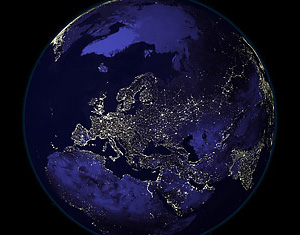
|
 |
 |
 Editorials | Environmental | March 2008 Editorials | Environmental | March 2008  
Earth Hour '08: Will It Matter?
 Bryan Walsh - Time.com Bryan Walsh - Time.com
go to original


| | It only lasts an hour Saturday evening in cities around the world, but Carter Roberts thinks that by switching off the lights, and raising global awareness, Earth Hour can start to address the crisis that is global warming. | | |
The average American produces about 20 tons of the major greenhouse gas carbon dioxide (CO2) every year. That might sound like a lot — and Americans do have among the biggest carbon footprints in the world — but the entire world emits around 27 billion tons of CO2 each year, through transportation, electricity use, deforestation. Look at those numbers for a moment, and you'll realize there's very little that any of us can do on an individual level to stop climate change. Live like a monk, take away your 20 tons — stop breathing if you'd like — and you'll barely scratch the surface.

It's numbers like those that can make Earth Hour so easy to criticize. Starting at 8 p.m. on Saturday in Christchurch, New Zealand, citizens from around the world will shut off their lights for an hour, to draw attention to the connection between energy use and climate change. From New Zealand, the event will move westward with the sun to Australia, Manila, Dubai, Dublin, New York, Chicago and finally end in San Francisco, where both the Bay Bridge and the Golden Gate Bridge will go dark for an hour. Earth Hour is being sponsored by the World Wildlife Fund (WWF), and its head Carter Roberts says the global event "will make a statement about our commitment to solve the climate change problem and symbolize the commitment that people will make throughout the rest of the year."

Earth Hour won't suffer for a lack of gimmicks. Servers wearing glow-in-the-dark necklaces will sell eco-tinis at bars and restaurants in Phoenix. A local yoga house in Michigan will offer sessions by lamplight, and the Sheraton Hotel in Chicago will have check-in by candlelight. Watching the lights wink off in major metropolitan areas might look impressive, but it's worth asking: What's the point? As Roberts himself notes, the energy saved by turning off your lights for an hour "won't make an enormous difference." So, if it won't cut carbon emissions, why bother then with Earth Hour, or Earth Day or Earth Live, last year's daylong concert for the environment?

Because climate change is essentially a political problem, and the language of politics is symbolism. Just because an act is symbolic doesn't mean it empty. The only way to truly reduce greenhouse gas emissions, to take the pressure off global warming, is an international regime that puts a cap and a price on climate pollution. And the only way that will happen is if politicians around the world become convinced that climate change is an issue that matters to people, one that will make them change the way they live, buy — and vote. "Unlike most of the issues that we grapple with, climate change is global," says Roberts. "The pressure is on us to do the right thing." If shutting off the lights for an hour on Saturday night and doing yoga in the dark makes that political support, well, visible, then Earth Hour will have been worth it.

The environmental movement is reaching a delicate moment. We're well past the point where going green is novel, where just doing your bit to save the Earth deserves endless praise. We've become inured to the existence of global warming, to its inconvenient truth, yet we sense that the solutions we've been given — change a light bulb, change your life — fall far short of the scale of the problem. We risk green fatigue because, after all, what can we do about it? But this is the moment when we need to keep pushing in every way we can. The technologies that will help us decarbonize energy are developing, but they need a push — and that will only happen if we keep climate change near the top of our political agenda. Earth Hour, Earth Day, Earth Year — we'll need it all. | 
 | |
 |



